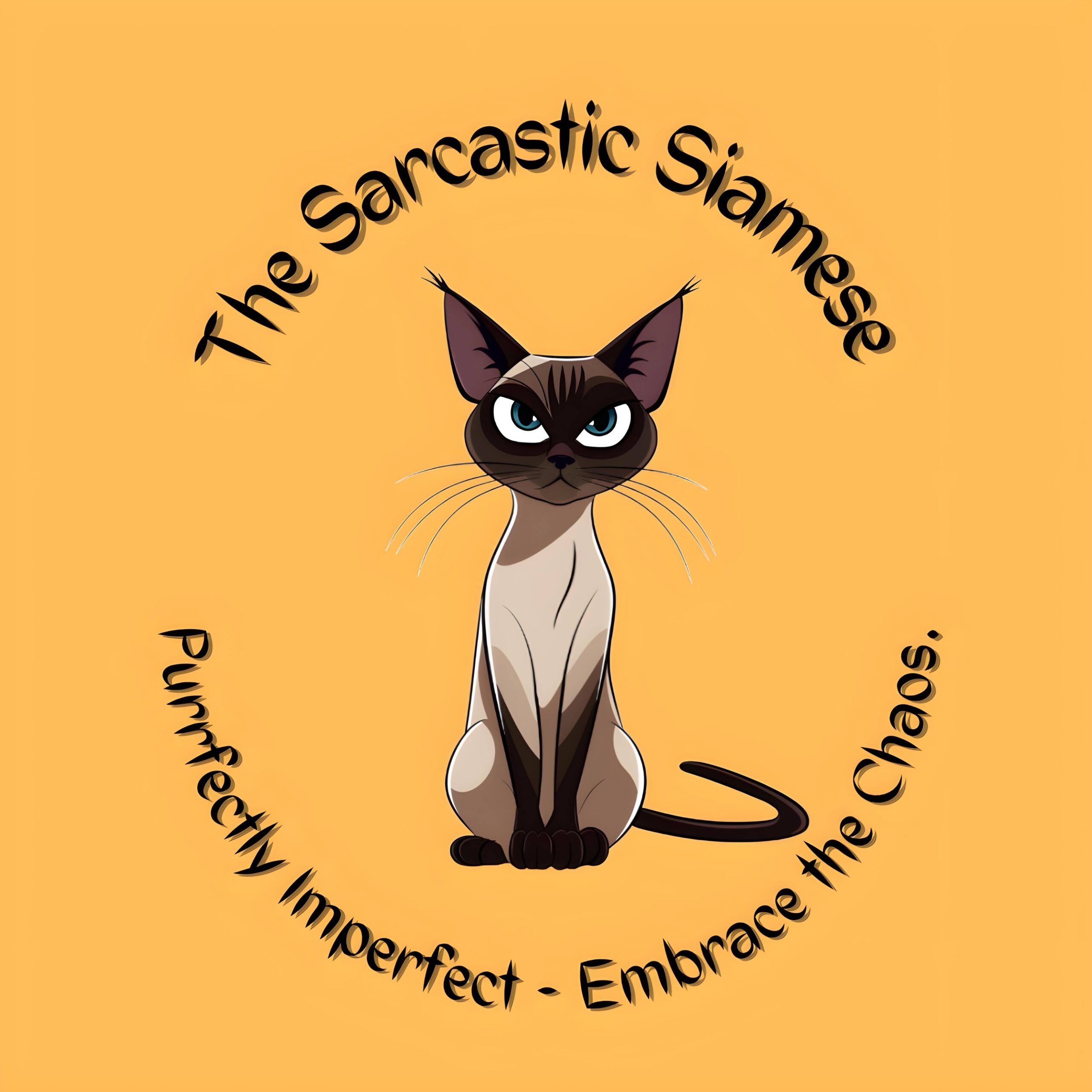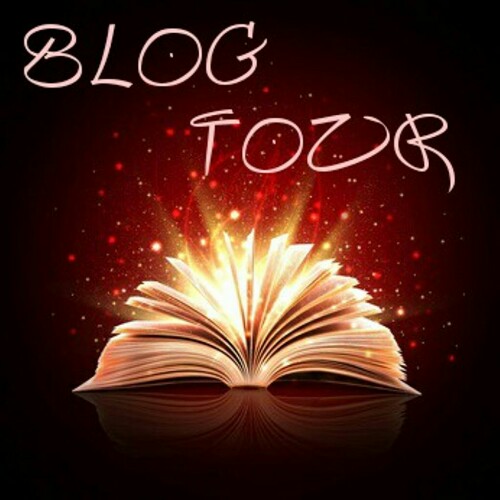
one $25 Amazon Gift Card, and one (signed) Quintaglio Ascension Trilogy in trade paperback
Follow the tour HERE for exclusive excerpts, guest posts and a giveaway!
![]()
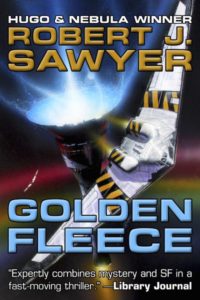
Golden Fleece
by Robert J. Sawyer
Genre: SciFi Mystery
Winner of the Aurora Award for best novel of the year. Named best novel of the year by The Magazine of Fantasy & Science Fiction.
MURDER IN SPACE
Starcology Argo. A superstarship on a mission to a distant world. Controlled by a monumental computer named JASON, the Argo proceeds flawlessly . . . until death strikes its sleek decks with sudden and mysterious precision.
Astrophysicist Diana Chandler is dead of radiation. Her body lies in the Argo’s ramfield — where hydrogen ions are funneled into the engines. Chandler’s death has been deemed suicide. But her ex-husband, Aaron Rossman, isn’t so sure. As he probes further, he becomes certain that Diana’s death is a matter of murder — and that the murderer is JASON!
Now Rossman must face the unthinkable: why would an artificial intelligence conceive and execute that most heinous of human crimes? And if so, can a mortal mind take on a cunning computer . . . and survive?
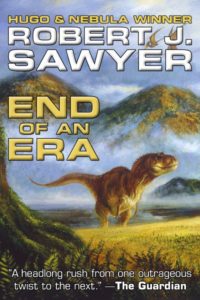
End of an Era
by Robert J. Sawyer
Genre: SciFi Fantasy
Paleontologist Brandon Thackeray is eager to find out what killed the dinosaurs. With a newly developed, still-experimental timeship, he will be able to do what no human being has ever done: stand face-to-face with a living, breathing dinosaur. But he and his partner (and rival) Miles “Klicks” Jordan discover that they are not the only intelligent creatures on Earth at the end of the Cretaceous. There’s a war going on and the dinosaurs are right in the middle of it.
Please note that this book is not part of The Quintaglio Ascension Trilogy. It is a stand-alone novel set on Earth.
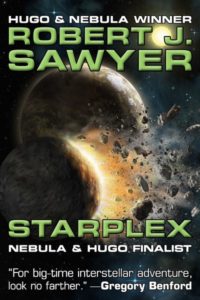
Starplex
by Robert J. Sawyer
Genre: SciFi Adventure
The only novel of its year to be nominated for both the Hugo and Nebula Awards. Starplex won Canada’s Aurora Award for best novel of the year.
For nearly twenty years Earth’s space exploration had exploded outward, thanks to a series of mysterious, artificial wormholes. No one knows who created these interstellar passages, yet they have brought the far reaches of space immediately close. For Starplex Director Keith Lansing, too close.
Discovery is superseding understanding. And when an unknown vessel — with no windows, no seams, and no visible means of propulsion — arrives through a new wormhole, an already battle-scarred Starplex could be the starting point of a new interstellar war . . .
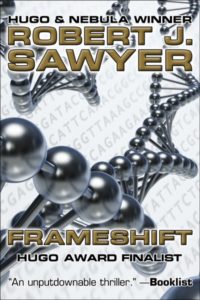
Frameshift
by Robert J. Sawyer
Genre: SciFi Thriller
Frameshift won Japan’s Seiun Award and was a finalist for the Hugo Award.
Pierre Tardivel is a scientist working on the Human Genome Project with the Nobel Prize winner, Dr. Burian Klimus. A driven man, Pierre works with the awareness that he may not have long to live: he has a fifty-fifty chance of dying from Huntington’s disease, an incurable hereditary disorder of the central nervous system. While he still has his health, Pierre and his wife decide to have a child, and they search for a sperm donor. When Pierre informs Dr. Klimus of their plan, Klimus makes an odd but generous offer: to be the sperm donor as well as to pay for the expensive in vitro fertilization. Shortly thereafter it transpires that Klimus might be hiding a grim past: he may be Ivan Marchenko, the notorious Treblinka death-camp guard known as Ivan the Terrible.
While digging into Klimus’s past with the help of Nazi hunter Avi Meyer, Pierre and his wife discover that Pierre’s insurance company has been illegally screening clients for genetic defects. The two lines of investigation begin to coverage in a sinister manner, while they worry about the possibility of bearing the child of an evil, sadistic killer . . .
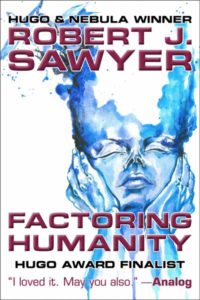
Factoring Humanity
by Robert J. Sawyer
Genre: SciFi
In 2007, a signal is detected coming from the Alpha Centauri system. Mysterious, unintelligible data streams in for ten years. Heather Davis a professor in the University of Toronto psychology department, has devoted her career to deciphering the message. Her estranged husband, Kyle, is working on the development of artificial intelligence systems and new computer technology utilizing quantum effects to produce a near-infinite number of calculations simultaneously.
When Heather achieves a breakthrough, the message reveals a startling new technology that rips the barriers of space and time, holding the promise of a new stage of human evolution. In concert with Kyle’s discoveries of the nature of consciousness, the key to limitless exploration — or the end of the human race — appears close at hand.
This edition includes a reading group guide.
![]()
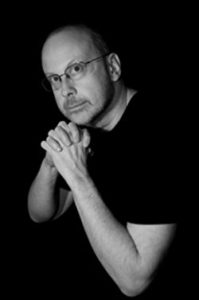
Robert J. Sawyer — called “the dean of Canadian science fiction” by The Ottawa Citizen and “just about the best science-fiction writer out there these days” by The Denver Rocky Mountain News — is one of only eight writers in history (and the only Canadian) to win all three of the science-fiction field’s top honors for best novel of the year:
- the World Science Fiction Society’s Hugo Award, which he won in 2003 for his novel Hominids;
- the Science Fiction and Fantasy Writers of America’s Nebula Award, which he won in 1996 for his novel The Terminal Experiment;
- and the John W. Campbell Memorial Award, which he won in 2006 for his novel Mindscan.
According to the US trade journal Locus, Rob is the #1 all-time worldwide leader in number of award wins as a science fiction or fantasy novelist. Recent honors include the first-ever Humanism in the Arts Award from Humanist Canada, the Queen Elizabeth II Diamond Jubilee Medal from the Governor General of Canada, the Hal Clement Award for Best Young Adult Novel of the Year (for Watch), and a Lifetime Achievement Aurora Award from the Canadian Science Fiction and Fantasy Association — the first such award given to an author in thirty years, and only the fourth such ever bestowed.
The 2009-2010 ABC TV series FlashForward was based on his novel of the same name, and Rob was a scriptwriter for that series.
Maclean’s: Canada’s Weekly Newsmagazine says, “By any reckoning, Sawyer is among the most successful Canadian authors ever,” and The New York Times calls him “a writer of boundless confidence and bold scientific extrapolation.” The Canadian publishing trade journal Quill & Quire named Rob one of “the thirty most influential, innovative, and just plain powerful people in Canadian publishing” (the only other authors making the list were Margaret Atwood and Douglas Coupland).
Rob’s novels are top-ten national mainstream bestsellers in Canada, appearing on the Globe and Mail and Maclean’sbestsellers’ lists, and they’ve hit #1 on the science-fiction bestsellers’ lists published by Locus, Amazon.com, Amazon.ca, Amazon.co.uk, and Audible.com. His twenty-three novels include Red Planet Blues, Triggers, Calculating God, and the “WWW” trilogy of Wake, Watch, and Wonder, each volume of which separately won the Aurora Award — Canada’s top honor in science fiction — for Best Novel of the Year.
Rob — who holds honorary doctorates from the University of Winnipeg and Laurentian University — has taught writing at the University of Toronto, Ryerson University, Humber College, and The Banff Centre. He has been Writer-in-Residence at the Richmond Hill (Ontario) Public Library, the Kitchener (Ontario) Public Library, the Toronto Public Library’s Merril Collection of Science Fiction, Speculation and Fantasy, Berton House in Dawson City, the Canadian Light Sourcesynchrotron, and the Odyssey Workshop.
Rob has given talks at hundreds of venues including the Library of Congress and the National Library of Canada, and beenkeynote speaker at dozens of events in places as diverse as Los Angeles, Boston, Tokyo, Beijing, and Barcelona. He was born in Ottawa in 1960, and now lives just west of Toronto.
Website * Blog * Facebook * Twitter * Amazon * Goodreads

Which characters from other authors in SF did you enjoy and why?
The most significant character for me was Robinette Broadhead, in Frederik Pohl’s Gateway. Pohl taught me a huge lesson with him, namely that the usual creative-writing-class dictum to write sympathetic characters was rubbish. The job, as Fred showed so well, is to write believable characters, nuanced characters, real-human-being characters.
Other than your novel FlashForward being adapted for Television, what other work have you done for television and movies? And what are your criteria for a good adaptation?
Like most people working in television and film, the majority of what I’ve written and been paid for has never actually been produced. I’ve been commissioned to write two feature films, two television pilots (one of which had William Shatner as an executive producer, and Bill and I went around pitching it together in Hollywood), a series bible for a revival of Robotech, a couple of other series bibles including the one that was used for the TV series Charlie Jade, treatments for TV miniseries, and more.
I loved the FlashForward TV series. I signed off on all the major changes before I’d sold the TV rights to ABC; I knew exactly what Brannon Braga and David Goyer intended to do in the pilot, and I thought they pulled it off magnificently. And remember, I was consultant on every episode and I wrote the nineteenth episode, Course Correction.
The novel I wrote might well have made an excellent movie, but it had to be opened up and changed to make it work as a TV series. My bachelor’s degree is in Radio and Television Arts from Ryerson University, the top broadcasting program in Canada; the business of making television has been a great interest of mine for decades. In fact, I’d go so far as to say The Making of Star Trek – the 1968 book by Stephen E. Whitfield and Gene Roddenberry that was the first-ever “Making of” book – was, for me, the single most influential nonfiction book I’ve read.
My favorite movies are all very liberal adaptations: Dr. Strangelove from Peter George’s very serious novel Red Alert; Casablanca from a tepid play called Everyone Comes to Rick’s; Planet of the Apes, which, in movie form was about the dangers of nuclear war and a satire on race relations, from Pierre Boulle’s very different novel La Planète de Singe, which was a satire on academic stuffiness; 2001: A Space Odyssey from Arthur C. Clarke’s short stories “The Sentinel” and “Encounter at Dawn.” So, I’ve always understood, and appreciated, what scriptwriters bring to the source material.
Why did you choose to write science fiction?
Science fiction is my primary genre focus because I get to write all other genres as well. Golden Fleece is science fiction but also a murder mystery. Far-Seer is science fiction but also an allegory. Starplex is science fiction but also a space opera. Frameshift is science fiction but also a genetics thriller. Rollback is science fiction but also a romance. Red Planet Blues is science fiction but also noir detective fiction. No genre gives you more latitude than science fiction.
Do you enjoy doing research? What is your key source for research- books, magazines, or the net?
Research is my favorite part of the process. I sometimes quip that I only write books to support my research habit; if someone would pay me just to learn things I’d be content doing nothing but that. And I’ve been enormously grateful for the special access to people and places I’ve been given as an author.
In addition, I also spend a lot of time talking face-to-face with real scientists; for instance, for the WWW trilogy I went to the AI lab at MIT, and spoke to AI pioneer Marvin Minsky. I also led a brainstorming session about web consciousness at the Googleplex – the international headquarters of Google – and Google cofounder Larry Page attended that. But, sure, like everyone these days, web research is my number-one source, supplemented by books, magazines, journals, and attending scientific conferences.
What advice would you give to young aspiring authors and artists?
First, the tough-love: if you can think of anything else that would make you happy, do that instead, because just about everything else is easier and has a higher likelihood of success; writing fiction is a business in which there is no clear career path, and no correlation between how good you are and how much you’ll make – it’s practically random.
Next, the pep-talk: write every day. Don’t talk about writing, don’t read books about writing, don’t take courses about writing. Just write – lots. Make the sacrifices – give up vacations, or lunches, or nights out with friends – so that you can find the writing time. Nothing is more effective at improving your writing than actually writing large amounts of material.
You chose to be a writer or artist to express yourself – so don’t go off and write media tie-ins set in some established franchise such as Star Trek or Star Wars; don’t do fake collaborations with a big-name writer where you work in that person’s universe; don’t put off doing the stories that are important to you; and don’t do anything just for the money. The arts are about passion; never lose sight of your own.
As a writer, your job isn’t to be blandly acceptable to everyone; it’s to be the favorite author of a narrow segment of the reading public. If I wasn’t alienating some people, I wouldn’t be doing my job. My late editor at Tor, David G. Hartwell, used to say to me, “You know you’re going to lose some readers if you keep that bit in,” and I’d say, “Yes, I understand that,” and we’d both nod and move on. I’m interested in being provocative and in getting people to think about things they perhaps haven’t pondered for years.
Read a lot of science fiction. The stuff you see on TV and in the movies bears only a passing resemblance to print science fiction; print science fiction is much more accurate with its science, and often much more character-driven.
Lastly, perseverance: it’s a game of attrition. Those who make it are the ones who never give up. But it’s a field that’s wide open to newcomers, so dive in and give it a try!
Is there a book in your backlog that stands out as being a particular challenge?
My 1996 novel Starplex was probably the most difficult. I was trying to wrap up every extant conundrum in astrophysics in one neat package. It was an extraordinarily complex book, and it was a challenge to make it accessible and interesting to those who weren’t already well-versed in cosmology. But it was the only novel from its year to be nominated for both the Hugo and the Nebula Awards, so I guess in the end I pulled it off.
Frameshift is one of your few present-day novels not set in Canada. Why?
The theme of the novel is Genetic Destiny, both on the personal level and the species level. I set the novel in the USA because I wanted to illustrate the point that universal health insurance is the only rational option when we can look at your DNA and see what diseases are in your future. I made the main character Canadian because being denied health insurance is so un-Canadian.
